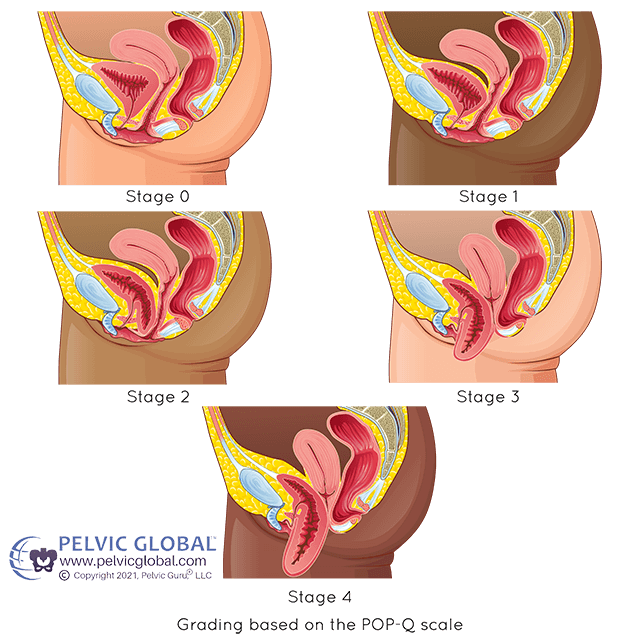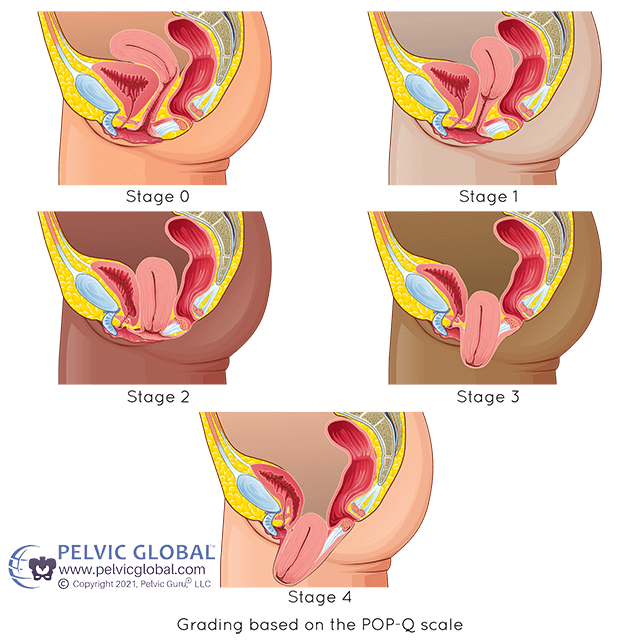Can I lift with a prolapse?
Photo by John Arano on Unsplash
The short and emphatic answer is yes, you can lift with prolapse!
Before I get on my soap box about how lifting with prolapse should be handled and managed, let me define prolapse. Prolapse is the descent of a pelvic organ. Prolapse can occur to the bladder, uterus, small intestine, rectum, urethra, and vaginal vault. In physical therapy, we do not diagnose prolapse or name the organ that is prolapsing, so you don’t need to worry about those specifics. It is helpful to be able to talk about where the descent is. In physical therapy we talk about it as the front (anterior vaginal wall, bladder), back (posterior vaginal wall, rectum), or middle (uterus).
Picture of bladder prolapse - 5 stages
Image used with permission from Pelvic Guru®, LLC www.pelvicglobal.com
Risk factors for prolapse include childbirth, pregnancy, constipation, and poor body mechanics. Pregnancy and childbirth are often blamed for prolapse occurring and the resulting symptoms, but chronic constipation is the number one risk factor. Just think about it, you will have a baby a finite number of time (even if you have a big beautiful family), but you will poop countless times in your life.
Let’s talk about poor body mechanics. Bearing down is one specific concern that we as practitioners have with body mechanics, and some people do bear down much more often and/or harder than they really should. This is simply a habit, and it can be changed. I have helped countless people change this habit. Having a habit of bearing down is not a reason to stop or limit activities or behaviors you enjoy.
There are many individuals who have been told to stop lifting or to limit the weight they lift to as little as 8lbs. For reference, a gallon of milk weighs 8lbs. Generally, this limitation refers to how much someone can lift when working out, but it just doesn't make sense. The same people are often functional in life, regularly lifting objects heavier than 8lbs such as a laundry basket, pot of water, or their child. In addition, limiting the weight you lift long term does nothing to help you get stronger and we do not have good evidence that it even stops your prolapse from progressing. Bearing down when you lift is a problem, but as I said above this is a habit that can and should be changed. Even if you only lift objects under 8lbs. Last, this is a one size fits all approach, which rarely is associated with excellent care. I do not like to provide one size fits all solutions or permanent limitations. Instead, I prefer to help you figure out your current limitations and how to move beyond those limitations.
As physical therapists, our job is to help you figure out your current limitations, help you work within those, and help you increase your capacity.
Picture of uterine prolapse at 5 stages
Image used with permission from Pelvic Guru®, LLC www.pelvicglobal.com
Moving beyond your limitations does not mean that I suggest being dangerous or lifting in a manner which is harmful to your body. For some people, there may be limitations to how much they can lift without an increase in symptoms. For others, a pessary may help them lift without causing further damage. Many people will have to change their mechanics to avoid or minimize worsening their prolapse (such as avoiding bearing down). None of these are permanent changes or limitations, and all should be customized recommendations based on testing your body’s response.
If you want to lift heavy you can do that, but need to figure out how to lift heavy without worsening your prolapse. Changing your mechanics helps your neurological system figure out how to better support your prolapsing organ(s) so you can lift without increasing your symptoms or worsening your prolapse. From there you can strengthen your muscles to be able to lift heavier and heavier weights.
Ready to get stronger, lift heavy (or light) weights, and stop living with permanent limitations? Set up your free consultation to find out how our physical therapists can help you.



